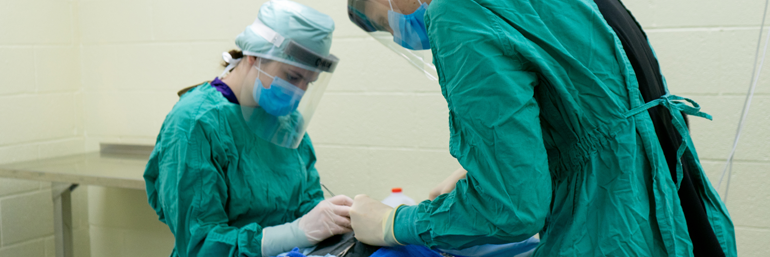Mar 15

A Natural Transition
A mammal’s neuromotor system is optimized to transition to eating solid foods. That might come as comforting news to mothers everywhere who wonder if their babies will ever make the switch from milk to full meals. It is also a finding worthy of publication in the Proceedings of the Royal Society B/ Biological Sciences – one of the international, peer-reviewed journals of the United Kingdom’s Royal Society, which describes itself as “the oldest scientific academy in continuous existence.”
The lead author on the Royal Society journal paper, titled “The contractile patterns, anatomy and physiology of the hyoid musculature change longitudinally through infancy,” is Christopher Mayerl, Ph.D., a postdoctoral fellow at Northeast Ohio Medical University.
Dr. Mayerl explains, “In this paper, we studied how the muscles involved in feeding in infant mammals change through infancy. We studied the animals’ morphology by using a contrast-enhanced CT scan and measured how they fed by combining electromyography (EMG) with high speed three-dimensional X-ray video. We found that as infants got bigger, the orientation of the muscles changed substantially, and that this has implications for mammalian feeding and evolution.”
The research was done in conjunction with the ongoing studies on swallowing conducted in the laboratory of Rebecca German, Ph.D., professor of anatomy and neurobiology. This research on how infants coordinate sucking and swallowing – and coordinate those processes with breathing – is relevant to feeding problems of people with neurodegenerative diseases such as Alzheimer’s.
In addition to Dr. Mayerl, the paper’s authors and their affiliations at the time of its writing are: Kendall Steer (an undergraduate at the University of Akron), Almasi Chava (Bio-Med Science Academy student); Laura Bond, B.S.; Chloe Edmonds, B.S.; Francois Gould, Ph.D.; Bethany Stricklen, B.S.; Tobin Hieronymous, Ph.D.; and Rebecca German, Ph.D.
Photo: Student Chloe Edmonds (left) with Christopher Mayerl

